Online friends
Search Articles
Tag Cloud
- depression
- intro
- anxiety
- piracetam
- supplements
- nootropic
- aging
- longevity
- Hello
- noopept
- Dopamine
- modafinil
- brain
- c60
- cancer
- ADHD
- resveratrol
- stack
- 07-04-2015
- health
- choline
- 01-04-2015
- memory
- new
- Aniracetam
- nad+
- nmn
- sleep
- introduction
- diet
- Exercise
- brain fog
- mitochondria
- ----
- rapamycin
- anhedonia
- life extension
- pramiracetam
- oxiracetam
- phenibut
- serotonin
- Supplement
- GABA
- stem cells
- research
- cryonics
- brain health
- ssri
- alcar
- nootropics
Fight Aging News
-
Fecal Microbiota Transplantation from Young Mice to Old Rats Reduces the Impact of Aging on the Heart
The aging of the gut microbiome involves a shift...
Today, 10:22 AM Read Full Story -
ADAM19 Knockdown Reduces Harmful Senescent Cell Signaling in Flies
While much of the focus on cellular senescence in...
Today, 10:11 AM Read Full Story -
[anti-aging firewalls] The next phase of my longevity program
Getting through ages 100 –125 alive and vibrantly...
Today, 12:10 AM Read Full Story -
Scientists Discover a New Mitigator of Senescence
Working with flies, mice, and human cells, scient...
Yesterday, 09:00 PM Read Full Story -
Human Glymphatic Function Declines with Age, Correlates with Cognitive Decline
Drainage of cerebrospinal fluid from the brain in...
Yesterday, 06:33 PM Read Full Story -
Single-Cell Clock Reveals Immune Aging
According to reports in Nature Aging , scientists...
Yesterday, 05:16 PM Read Full Story
"Healthy Aging" is not enough
 A Response to the "Compression of Morbidity" Mindset
A Response to the "Compression of Morbidity" Mindset
|
"...there is no basis for the ardent hopes and positive statements made as to [its] safety and success[..], and [..] therefore, it would be a wrong, whether wilful or unknowing, to lead the people and perhaps governments at this time to believe the contrary;..." |
|
I will come back to this quote shortly. |
The popular and wide spread article about the need to support and
fund the compression of morbidity called the "Longevity Dividend" is a
good example of a solid piece detailing a need to fight aging. In it,
the authors show the viability of slowing the aging process, urge people
to support it, urge the government to direct funds to it, and urge
places like the NIH to reserve more resources for it. 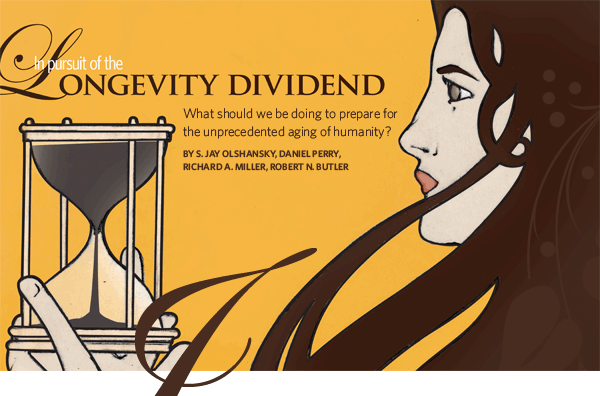 However, they don’t push for indefinite health-spans or indefinite life
extension, here after referred to as indefinite life extension. They
push rather for the 'compression of morbidity', or in other words, for
more healthy years in the last period of a person’s average, traditional,
70- to 90- year life span. However, they don’t push for indefinite health-spans or indefinite life
extension, here after referred to as indefinite life extension. They
push rather for the 'compression of morbidity', or in other words, for
more healthy years in the last period of a person’s average, traditional,
70- to 90- year life span.
“This compression of mortality and morbidity would create financial gains not only because aging populations will have more years to contribute, but also because there will be more years during which age-entitlement and healthcare programs are not used.” S. Jay Olshansky, Daniel Perry, Richard A. Miller, Robert N. Butler, 2006 |
| At the same time the authors work to discredit the pursuit of indefinite
life extension. They suggest that altering genes would
not be practical, useful, or ethical. They call indefinite life
extension unrealistic and suggest that it is not feasible. Although they
are not focused exclusively on compressing morbidity, as much of the
gerontology community has been, they are still mired in old-school
thinking.
The overall mindset includes older academic scholars who have grown through the younger, naïve dreaming stages (where people tend to think more about things like indefinite life extension) into the realm of more realistic endeavours like the compression of morbidity. |
|
In response |
 We must never forget that we are cosmic revolutionaries, not stooges conscripted to advance a natural order of things that kills everybody.” Alan Harrington Achieving indefinite life extension is the most important, urgent,
and time-sensitive cause ever undertaken in the history of humanity, and
with all due respect, sentiments like those expressed by proponents of
the compression of morbidity, though very noble and well meaning, are
misleading and harmful to this cause. |
| People are right when they say that it is not productive or healthy
to over hype this cause, or anything for that matter. Incidental
examples are not representative. Also we cannot afford to confuse this
cause's efforts with hype when they are not. This is a real, urgent,
life-or-death cause. Its components are by their very nature demanding,
large, and extraordinary. They require reciprocating reflection,
dialogue, and action. This is more than a scientific endeavour; this cause demands work, development, and in depth sociological reform as well. The two need to work together and acknowledge each other, rather than occasionally (and some times more often) misunderstand each other. We work to help facilitate these and other aspects more fluently, as we continue growing toward where humanity needs this cause to go. |
|
We don’t have to know we can get there to go there,
|
Compression of Morbidity isn’t a bad thing per se. However, portraying to the public that indefinite life extension is not in the cards is. If people think that they can not get indefinite life extension in time for them, they won’t fight nearly as hard as this cause needs them to. |
People like Dr. Aubrey de Grey of the SENS Foundation, who work
on strategies for ending aging, say that the first person to live to
1,000 might be 60 years old now. He’s not s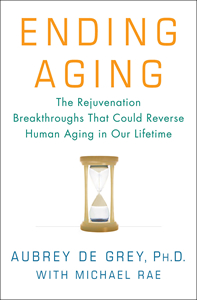 aying that the first
person to live to 1,000 is alive now. There’s a big difference.
“Might” means go and see; “is” means go and get. We aren’t going there
to get indefinite life extension; we are going to see if it is there to
get or not. Organisations like ImmInst, stress that the world can see
indefinite life extension if it supports this goal with urgency. aying that the first
person to live to 1,000 is alive now. There’s a big difference.
“Might” means go and see; “is” means go and get. We aren’t going there
to get indefinite life extension; we are going to see if it is there to
get or not. Organisations like ImmInst, stress that the world can see
indefinite life extension if it supports this goal with urgency. When something is this important, allowing people to open their
minds to the realities that breakthroughs may be around the corner is
important.
|
| It is not the goal in and of itself in the same way that getting the
“No Coloreds Allowed” signs removed wasn’t the goal of the Civil Rights
Movement or performing 50 more space launches to orbit the earth wasn’t the goal in getting to the moon. Martin Luther King Jr. stated the notion that it was no time for gradualism and that justice too long delayed was justice denied. |
|
"We have also come to this hallowed spot to remind America of the fierce urgency of now. This is no time to engage in the luxury of cooling off or to take the tranquilizing drug of gradualism.”
Shallow understanding from people of good will is more frustrating than absolute misunderstanding from people of ill will. Lukewarm acceptance is much more bewildering than outright rejection.” Martin Luther King Jr. |
|
They needed to set ambitious goals that went all the way. |
|
“We choose to go to the moon. We choose to go to the moon in this decade and do the other things, not because they are easy, but because they are hard, because that goal will serve to organize and measure the best of our energies and skills, because that challenge is one that we are willing to accept, one we are unwilling to postpone, and one which we intend to win, and the others, too.”
John F. Kennedy |
|
They needed to go there. It is the same for this cause. |
| We don’t have to know we can get there to go there, but we do have
to go there to get there. Things like the removal of “Coloreds Only”
signs, orbits around the earth and 7-year dividends, are parts of
it, but the struggle for cilvil liberties and the moon landing would not
have reached their potential if the visionaries had not dreamt to go all
the way, rather than hoped to go a portion of the way. |
|
“The great French Marshall Lyautey once asked his gardener to plant a tree.
We have to plant the seed that we are undertaking the quest for
indefinite life extension now. We have to take into consideration the fierce urgency of now; we have to have a dream; we ha This is the next great human mission. Through blood, sweat and tears, progress, joys, and dreams, our ancestors have delivered us to this cusp at the end of the technology era, which is emerging into the grand new Transhuman era. In a way, we have been preparing through out all of human existence for this. We cannot let our ancestors down. This is an immense homage we owe to them for their great sacrifices and hard work, as well as an obligation that we owe to ourselves and all of our dear progeny of the future. There is no time to waste. We must plant the seeds we have been handed, the seeds of the movement for indefinite life extension, now. We have to get going now. |
|
Let me get back to that statement from the beginning -- and quote it in full this time:
Rear Admiral George Melville (1901) Those who 'know better' are often worn down by a lifetime of trying. |
Those who kick against a prevailing mindset can expect ridicule,
 even at the cusp of their breakthrough. "...a physicist who professed such heresies is unworthy to teach science." German Minister of Education, |
| We aren’t of those mindsets; we are of the mindset of one of the founders of the scientific method itself, |
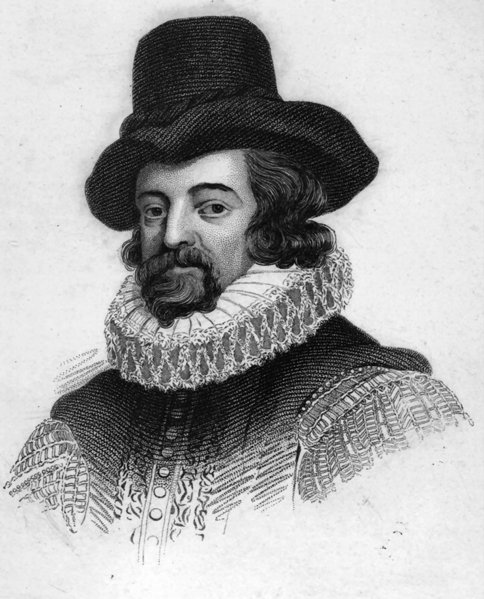 “But by far the greatest obstacle to the progress of science and to the undertaking of new tasks and provinces therein is found in this–that men despair and think things impossible.” Francis Bacon |
| They say that necessity is the mother of invention. If people don’t want it, crave it, fight for it, and believe they can have it, they they are going to innovate at a much slower rate. |
|
Fighters know this, and in their hearts, scientists know this as well.
General Douglas MacArthur “100% of the shots you don’t take don’t go in.” Wayne Gretzsky |
| We may not be able to get there, but we have to believe we can if we are to put forth the amount of effort that is needed to get it done in time for us if it is there. |
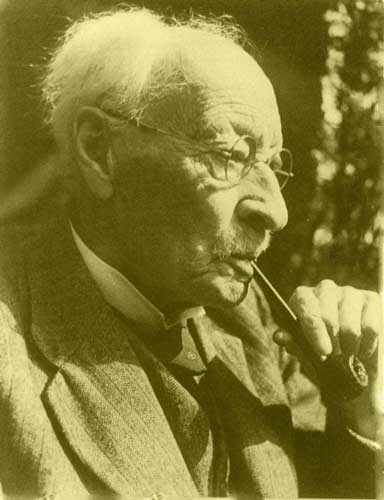 “The universe is full of magical things, patiently waiting for our wits to grow sharper.” Eden Phillpotts We don’t intend to keep it waiting. The time is now. For the love of life, we may not get there, but we have to go there, and we have to do it like our lives depend on it. |
|
Eric Schulke |































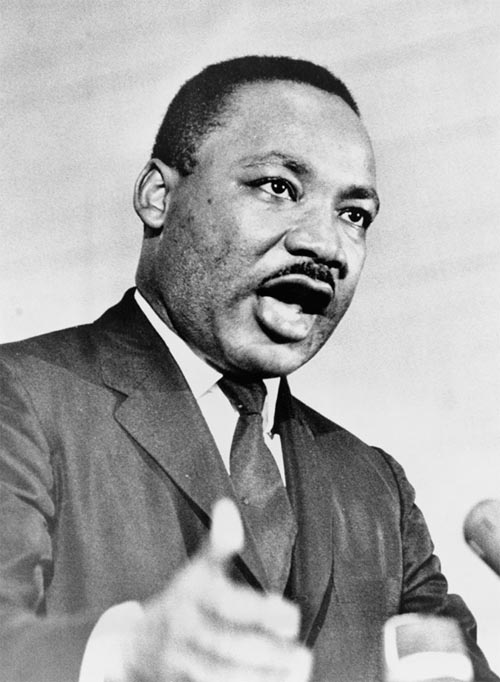 “I have almost reached the regrettable conclusion that the Negro's great stumbling block in his stride toward freedom is not the White Citizen's Counciler or the Ku Klux Klanner, but the white moderate, who is more devoted to 'order' than to justice; who prefers a negative peace which is the absence of tension to a positive peace which is the presence of justice; who constantly says: 'I agree with you in the goal you seek, but I cannot agree with your methods of direct action'; who paternalistically believes he can set the timetable for another man's freedom; who lives by a mythical concept of time and who constantly advises the Negro to wait for a 'more convenient season.'
“I have almost reached the regrettable conclusion that the Negro's great stumbling block in his stride toward freedom is not the White Citizen's Counciler or the Ku Klux Klanner, but the white moderate, who is more devoted to 'order' than to justice; who prefers a negative peace which is the absence of tension to a positive peace which is the presence of justice; who constantly says: 'I agree with you in the goal you seek, but I cannot agree with your methods of direct action'; who paternalistically believes he can set the timetable for another man's freedom; who lives by a mythical concept of time and who constantly advises the Negro to wait for a 'more convenient season.'
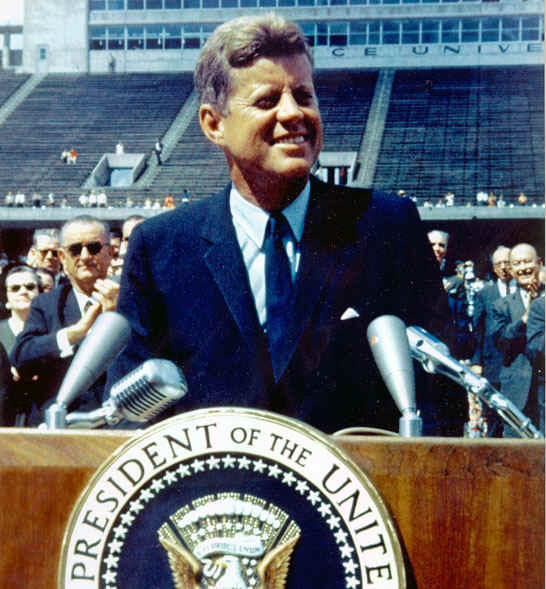 “…even though I realize that
this is in some measure an act of faith and vision, for we do not now
know what benefits await us.
“…even though I realize that
this is in some measure an act of faith and vision, for we do not now
know what benefits await us.  ve to shoot for the
moon. We have to start now. We have to go there. We have to see if our lives are in the cards for us or not. Missing out on this chance to exist here because we don’t go there would be as big of a tragedy as if the Americas were still undiscovered, blacks were still segregated, and the moon were still untouched.
ve to shoot for the
moon. We have to start now. We have to go there. We have to see if our lives are in the cards for us or not. Missing out on this chance to exist here because we don’t go there would be as big of a tragedy as if the Americas were still undiscovered, blacks were still segregated, and the moon were still untouched.  "...there is no basis for the ardent hopes and positive statements made as to the safety
and successful use of the dirigible balloon or flying machine, or both, for commercial transportation or as weapons of war, and that, therefore, it would be a wrong, whether wilful or unknowing, to lead the people and perhaps governments at this time to believe the contrary;..."
"...there is no basis for the ardent hopes and positive statements made as to the safety
and successful use of the dirigible balloon or flying machine, or both, for commercial transportation or as weapons of war, and that, therefore, it would be a wrong, whether wilful or unknowing, to lead the people and perhaps governments at this time to believe the contrary;..."
 “It is fatal to enter any war without the will to win it.”
“It is fatal to enter any war without the will to win it.”











1 Comments
Sent from my iPad using Tapatalk